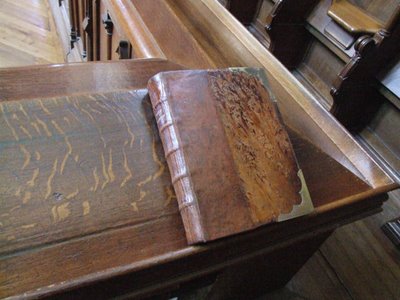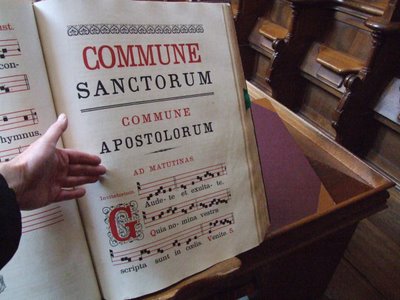Back to earth
The prayer of the humble pierces the clouds, and it will not rest until it reaches its goal; it will not desist until the Most High responds. (Ecclesiasticus 35.17)

I got back from my few days at Parkminster this evening. Having opened the post, sorted out and resized some photos, here is just a taster - lots more to follow.
First, the Brothers' chapel. Nowadays, the distinction between the brothers and the Choir isn't so sharp but the brothers use this chapel during the office. The books that I had in my cell gave the option of saying a certain number of Our Fathers and Hail Marys instead of some of the office recited in private. So the Carthusians offered the opportunity of silence and solitude for anyone - you never had to be conversant with Latin or the intricacies of the office.

Through the screen is the main choir:

The monastery has always done its own printing and binding. Many of the books in daily use are over 100 years old. Each day at Mass, the chant is all sung from copies of the Graduale Cathusiense printed in 1897. They are bound in leather which is still in excellent condition - owing to the fact that the books are handled and used every day.

Here is the title page of the Graduale:

And here is the enormous Antiphonale Nocturnum

These are placed on book stands so that they are more upright and can be read more easily. There is one copy between two or three monks.
The Night Office begins at 12.30am in total darkness as the traditional silent prayers are said before the Office begins. The feast of St Bartholomew on Wednesday was a 12 lesson feast - referring to the 12 lessons read at Matins. After the 18 psalms, the lections are read and the responsories sung in turn by members of the community going down the choir. The Te Deum, as with many Carthusian chants, is very similar to the Roman solemn tone but different in a few details because the Carthusian chant predated the later standardisation of the chant. There is a pause of five minutes or so - again in total darkness and silence - before Lauds is begun. The Night office for the 12 lesson feast lasted three hours. For the normal days, it was about two hours.
It is important to understand that the Carthusians do not so much interrupt their sleep to say prayers - rather, they interrupt their silent and choral prayer for two periods of sleep. The Night Office is the main work of the Carthusian 24 hour day. Vespers is also sung in choir - the offices of Prime, Terce, Sext, and None are usually said in cell (except on Sundays). Compline is always said privately.

I got back from my few days at Parkminster this evening. Having opened the post, sorted out and resized some photos, here is just a taster - lots more to follow.
First, the Brothers' chapel. Nowadays, the distinction between the brothers and the Choir isn't so sharp but the brothers use this chapel during the office. The books that I had in my cell gave the option of saying a certain number of Our Fathers and Hail Marys instead of some of the office recited in private. So the Carthusians offered the opportunity of silence and solitude for anyone - you never had to be conversant with Latin or the intricacies of the office.

Through the screen is the main choir:

The monastery has always done its own printing and binding. Many of the books in daily use are over 100 years old. Each day at Mass, the chant is all sung from copies of the Graduale Cathusiense printed in 1897. They are bound in leather which is still in excellent condition - owing to the fact that the books are handled and used every day.

Here is the title page of the Graduale:

And here is the enormous Antiphonale Nocturnum

These are placed on book stands so that they are more upright and can be read more easily. There is one copy between two or three monks.
The Night Office begins at 12.30am in total darkness as the traditional silent prayers are said before the Office begins. The feast of St Bartholomew on Wednesday was a 12 lesson feast - referring to the 12 lessons read at Matins. After the 18 psalms, the lections are read and the responsories sung in turn by members of the community going down the choir. The Te Deum, as with many Carthusian chants, is very similar to the Roman solemn tone but different in a few details because the Carthusian chant predated the later standardisation of the chant. There is a pause of five minutes or so - again in total darkness and silence - before Lauds is begun. The Night office for the 12 lesson feast lasted three hours. For the normal days, it was about two hours.
It is important to understand that the Carthusians do not so much interrupt their sleep to say prayers - rather, they interrupt their silent and choral prayer for two periods of sleep. The Night Office is the main work of the Carthusian 24 hour day. Vespers is also sung in choir - the offices of Prime, Terce, Sext, and None are usually said in cell (except on Sundays). Compline is always said privately.